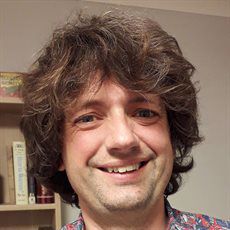
Alan Wood was a Lecturer in Space Weather and Space Systems Engineering and was part of the Space Environment and Radio Engineering (SERENE) group in the School of Engineering.
Space weather causes the northern lights, which are one of the most beautiful of all natural phenomena. However, many of our technological systems are vulnerable to other consequences of space weather. Alan’s research is focussed on improving our understanding of these phenomena, particularly at mid- and high-latitudes.
Alan is an enthusiastic communicator. In addition to undergraduate teaching, he enjoys showcasing this fascinating research area to schools and the wider community.
- Ph.D. “Multi-instrument studies of the high-latitude nightside ionosphere”, University of Wales Aberystwyth, 2008
- Postgraduate Diploma in Journalism Studies (Broadcast Option), Cardiff University, 2003
- M.Phys. in Physics with Planetary and Space Physics (1st Class), University of Wales Aberystwyth, 2002
Alan qualified with MPhys (Hons) in Physics with Planetary and Space Physics from the University of Wales Aberystwyth in 2002. His undergraduate studies included five months in the arctic at the University Centre on Svalbard (UNIS), which stimulated his interest in space weather. He studied for a PhD at Aberystwyth where he conducted observational studies of the high-latitude nightside ionosphere.
Upon completion of his PhD, he worked as a Postdoctoral Research Associate in Planetary Magnetospheres and Ionospheres at Aberystwyth University, before joining the School of Engineering at the University of Liverpool where he worked on a road safety project. He subsequently applied the statistical methods from this road safety project to the ionosphere and that forms the basis of much of his current work.
In 2012 Alan was appointed as a lecturer in the School of Science and Technology at Nottingham Trent University. He moved to the Space Environment and Radio Engineering (SERENE) group at the University of Birmingham in 2021. There, his research interests spanned space weather and its impact on the terrestrial environment. In 2025 he moved to the UK Met Office as a Senior Scientist.
He is also a qualified broadcast journalist. Alan trained at the Cardiff Journalism School and has worked as a journalist at Southern Gloucestershire’s Star 107.
Alan’s research is focused on plasma structures in the terrestrial ionosphere, which can impact technological systems including Global Navigation Satellite Systems (GNSS), of which the best known is GPS (Global Positioning Service). He seeks to determine the morphology, origin and evolution of these structures. These structures can be driven from above (in which case they give a fundamental insight into the coupling of the Earth’s atmosphere to the near-space environment) or from the terrestrial environment (in which case they give a fundamental insight into vertical and./or horizontal coupling within the atmosphere).
He uses a range of observational instruments including the EISCAT (European Incoherent Scatter) radars, the International LOFAR (Low Frequency Array) Telescope and the ESA (European Space Agency) Swarm satellites.
- Member of the Oxford, Cambridge and RSA Exam Board Science Forum
- Member of the UK EISCAT (European Incoherent Scatter) Advisory Group
